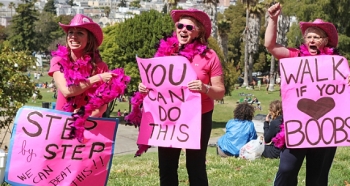

By Kim Voynar Voynar@moviecitynews.com
Point of View: Activist Barbara Brenner on Pink Ribbons and Pinkwashing
 I found Pink Ribbons, Inc, which I reviewed at Toronto, so fascinating that I had to follow-up on it. My grandmother died of breast cancer that we thought was cured, but that suddenly came back aggressively a couple decades after we thought she was done with it, metastasizing into her lung and ending her life very rapidly. We have a family history of breast cancer, so as a person with those particular lady parts, and three daughters who will also carry that genetic risk of potential breast cancer down the road, this is a topic that’s pertinent to me. And my own experience with being very ill in late 2009-early 2010 drove home for me even more the need to think about causes and prevention and what I can do to ensure my own continued good health for a long time.
I found Pink Ribbons, Inc, which I reviewed at Toronto, so fascinating that I had to follow-up on it. My grandmother died of breast cancer that we thought was cured, but that suddenly came back aggressively a couple decades after we thought she was done with it, metastasizing into her lung and ending her life very rapidly. We have a family history of breast cancer, so as a person with those particular lady parts, and three daughters who will also carry that genetic risk of potential breast cancer down the road, this is a topic that’s pertinent to me. And my own experience with being very ill in late 2009-early 2010 drove home for me even more the need to think about causes and prevention and what I can do to ensure my own continued good health for a long time.
So I followed up with one of the activists featured prominently in the film, Barbara Brenner, former Executive Director of the activist group Breast Cancer Action, who now blogs regularly on her own site, Healthy Barbs. Barbara was diagnosed with Breast Cancer in 1993, helmed BCA for 15 years, and currently writes a lot about things like research, environmental causes related to cancer, and her own struggles now in dealing with ALS. Her recent post on what she’s gone through by agreeing to participate in a clinical trial for a new drug for ALS treatment is particularly harrowing.
Barbara very kindly pointed me to a lot of information about her work with Breast Cancer Action and agreed to an email interview to provide some clarification about why she feels so strongly that “pinkwashing” the issue of breast cancer is detrimental.
Kim Voynar: What kind of response or backlash have you gotten from the Susan G. Komen Foundation, Avon, Estee Lauder, and the like with regard to the BCAs activism? I’ve been trying to research what exactly those organizations are funding with regard to actual research and results, and I’m having a hard time digging anything up that feels entirely substantial.
Barbara Brenner: Your difficulty in finding substantial information about research and results is exactly the problem that we all have. All the organizations that fund research are delighted to tell you how much they have invested in research, but rarely do they tell you the outcome of that research. This is a point Ellen Leopold makes elegantly in the film, I think: for all that’s been invested, why don’t the organizations tell us what they have to show for the investment. Probably because, for all that’s been invested, we have very little to show for it. If you look at Herceptin, for example, that was probably the biggest breakthrough in drug treatment in the last 20 years, and every funding agency I know of claimed to have been involved in funding it. And they probably were, since research is
so expensive and not coordinated, researchers have to go to a lot o sources to get the funding they need.
BCA did a campaign some years ago urging the funding agencies to work together. We called it “answers wanted.” You can see it here. The campaign was unsuccessful because, though the agencies each answered the emails encouraging them to work with each other, they all claimed to be doing that, though how they claimed to do it in very different ways. The responses themselves were a testament to the extent of the problem.
As for backlash, different organizations have responded differently. Komen and BCA are polar opposites, and Komen leadership believes that Think Before You Pink (TB4UP) is about them. I heard that from a PR Week reporter in 2002 when we launched the campaign. As I told that reporter, the campaign is about all cause marketing, Komen put itself in harm’s way on that score. When BCA pushed Komen on environmental links and pinkwashing, they responded either with bad science on environmental links, or completely defensively, as they did with BCA’s “What the Cluck?” Campaign about their KFC partnership. They are so big that they don’t really have to answer to anyone.
Avon is different story. BCA took on Avon starting in 2000 when I wrote a column entitled “Exercise Your Mind” encouraging people to think about how the money was raised and spent from breast cancer walks. You can find the column in an archived BCA Newsletter: . That column then ran as an op ed in the San Francisco Chronicle. Then we started hearing from other organizations who had issues with Avon’s walks, so we formed a “Follow the Money” coalition that approached Avon about changing some of their practices. We met with company reps and asked nicely. That didn’t work — they shined us on. So we started demonstrating at their walks and doing shareholder activism. That had some impact — they changed the event coordinator of their walks. But it was not until a new guy came in at Avon — Marc Hurlbert (he’s also in the film, saying a couple of not true
and stupid things) — who tried to address some of our concerns about the walk.
In terms of what Avon funds, they have given money to a ridiculously named organization called Zero Breast Cancer that’s involved in environmental research, and to Susan Love who is engaged in a so far not-very-successful attempt to do environmental research. They have also given money to the California Breast Cancer Research Program which is funding environmental research. But these are all small grants in the scheme of things.
The Breast Cancer Research Foundation, as you probably know, is the creation of Estee Lauder. They claim to be committed to prevention, but they mean pills. Any pill powerful enough to reduce the risk of breast cancer will create side effects that are not good, so pills for prevention are essentially disease substitution. (That’s a different riff
about which I’m happy to give you more information if you want.) BCA never heard much from them, except in response to our Answers Wanted campaign (see above). They run ads that intensely sexualize breast cancer, and BCA complained about them publicly.
KV: When I look at the Komen Foundation’s research and grant info, they seem to be focusing heavily on early detection, treatment models, and biology, but not so much on research into things like environmental causes and understanding why the breast cancer rate continues to rise, and this doesn’t make a lot of sense to me. They have a lot of bullet points, but I’m not finding much in the way of how they determine what to grant funds to. They have a donation button on their site, but if I was to go there and donate, what exactly is my money going to? Avon seems even more questionable. For all of them, they seem to do a lot of work on PR bullet points rather than factual information.
BB: What you found about Komen’s focus of grant funding reflects who they are, and have always been. They have not funded environmental research. They recently gave a grant to the federal Institute of Medicine to review the information on environmental links, but that is basically a literature review, not new research. And the information Komen provides about environmental links on their website is often flat out wrong. Komen can’t get involved in environmental research in a serious way, in my view, because they are partnered with so many companies that are part of the problem. That they don’t tell anyone how they decide what to fund is a sad commentary on breast cancer research.
Why aren’t more people asking the kinds of questions you’re asking and forcing these research entities to show us what the money buys in terms of better outcomes for patients and true prevention?
I wrote about Avon’s funding above. I should explain what I thought was so outrageous about Marc Hurlbert’s statements in the film. He says that the Avon Foundation is independent of the Avon Corporation that makes the cosmetics, but the Foundation receives $1 million a year from the corporation, as well as product to give away at their walks. That is hardly independence. More ridiculous is his statement that Avon’s products are completely safe. That is b.s.
 KV: I’m also curious what the response has been to the “think before you pink” thing and pinkwashing in general, from people who participate in those walks and rallies and whatnot. Watching them in the film, they had a tone that felt to me similar to a religious rally, where you’re expected to assume that what you’re doing is a “good thing” and feel positively about yourself for doing it. Have you had to fight a lot against the perception that the work of activists like yourself is detrimental to this “feel-good” cause?
KV: I’m also curious what the response has been to the “think before you pink” thing and pinkwashing in general, from people who participate in those walks and rallies and whatnot. Watching them in the film, they had a tone that felt to me similar to a religious rally, where you’re expected to assume that what you’re doing is a “good thing” and feel positively about yourself for doing it. Have you had to fight a lot against the perception that the work of activists like yourself is detrimental to this “feel-good” cause?
BB: Breast Cancer Action as an organization and I in my professional and personal capacity have had quite a time contradicting the perception that we’re making people feel bad or even discouraging funding. When we launched TB4UP we got a lot of calls and emails (mostly but not entirely from men) asked who did we think we were to question the motives of companies that were funding research. For the first few years of the campaign, we really got slammed by critics. More recently, the pink washers have been on the defensive, accusing us of “looking a gift horse in the mouth.”
By the time I left BCA, we weren’t hearing so much from the walkers any more. When we did hear from them, we would try to explain what we were trying to accomplish. We converted some people. But I think most of the people who do the walks and runs are clueless that there is another point of view — confirming your religious rally analogy.
Here’s the trailer for Pink Ribbons, Inc. Check it out, and I’ll keep you apprised of when it might be coming your way.















I had the same reaction to the film. It got to me. Here’s an interview I did with the director and producer. At least we are talking about this
http://blogs.indiewire.com/womenandhollywood/archives/pink_ribbons_inc_-_directed_by_lea_pool/
Thanks for digging in deeper and it was good seeing you in Toronto.
What a terrific film. We need to Occupy Pink and demand accountability for the dollars raised.
And, Pink Ribbons, Inc got picked up today by First Run Features! Good job.
http://moviecitynews.com/2012/02/first-run-features-to-release-new-feature-documentary-pink-ribbons-inc/